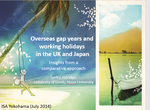The overseas working holiday and graduate employment trajectories: A cross-cultural comparison
 Image courtesy of tiramisustudio at FreeDigitalPhotos.net
Image courtesy of tiramisustudio at FreeDigitalPhotos.net
My PhD thesis examines claims that transnational youth mobility represents a means for students and graduates to invest in employability through the adoption of a cross-national comparative approach. It employs qualitative interviews with former working holidaymakers, careers advisers, and employers in Britain and Japan, comparing accounts both within and across country contexts. The research investigates how student and graduate aspirations, orientations, and career trajectories - and employer perceptions and values - are shaped by both the economic and socio-cultural context(s) within which they are situated and their own position within this context. The research further explores variation in how experiences are mobilised and valued (i.e., as cultural and symbolic capital) according to national context, employment sector, institutional arrangements, and cultural values. It highlights how differing perceptions of experiences of work and travel overseas, and different ideas about what constitutes the ideal employable graduate, are embedded within - and illuminate key features of - specific economic and socio-cultural contexts. This challenges notions of employability that position graduate skills and attributes as discrete and measurable objects existing in an external world, carried by students and graduates, and valued by a neutral labour market. Further, the relationship between mobility and privilege itself is also shown to vary with economic and socio-cultural context. What constitutes the “right story” about experiences of work and travel overseas - and how such activities may be linked to the (re)production of social inequalities - is thus also shown to be highly contingent on context.
